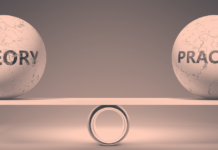Just a few final words on this issue.
One of the readers of the blog I posted on March 27 on madinamerica.com identified himself as an experienced social worker working as a program director. In response to the question posed in the post’s title “1984 & DSM5 Re-visited: Where Are the Social Workers?”, he stated that the social workers in his agency were sunk in a funk: powerless and dispirited, unwilling to engage in discussions re. the fatal impact of the atypicals on their clients, re. the long-term import of the new DSM. Their self-identity was that of expendable handmaidens to psychiatry and the biomedical model, and their principal task had become to preserve their precarious status and their jobs.
Sad yet unsurprising and pervasive in an oppressive public mental health system … if its patients – or, more accurately, peer/survivors – can be screwed, so will the staff.
He revealed that he, too, felt powerless and isolated. So I welcomed him to the “Do-the-Right-Thing” Club, told him I had been a career-long member and that I had written the post to connect with other social workers just like him. I could have gone on to tell him something I suspect he already knew … that I was not the founder of the Club, that it had its origins in the one-hundred and thirty year old roots of social work, where those who walked the streets of the country’s big cities and knocked on doors looking to help others were committed first and foremost to those they were seeking to help. Its legacy, signified in modern times by the iconic slogans “self-determination” and “social justice,” has been carefully safeguarded by succeeding generations of social workers – the settlement house workers, the community organizers – and by the Bertha Capen Reynolds Society which, a sign of the times, recently changed its name to the Social Welfare Action Alliance.
That commitment, that mission, of course, has had to co-exist from the beginning with a very prominent social control mandate; taken together, they constitute the dialectic that marks every liberal profession in the U.S. of A. Times change, however, and the country is gripped in fear of “the other”, a phenomenon that has deformed every one of our institutions and their caretakers, including the public mental health system and the social work profession. Social work’s social control function appears to be subsuming its social change mission. Its corresponding embrace of the biomedical model and the DSM, the biomedical model’s principal propaganda organ, has also undermined social work’s psychosocial mission. In sum, wittingly or not, social work is contributing to its own demise … the end of social work as we have known it.
I should have gone on to tell my reader that social work needs a new mission: no longer a commitment to help those in I need but rather a commitment to join with those seeking help in a conjoint and co-equal pursuit of personal liberation. As Franz Fanon pointed out, you can’t help a person if you’re oppressing him or her: your help simply becomes a form of oppression and the price paid by both – loss of self-identity, of who you are – becomes too high. Social work has lost its identity. Reclamation of its sense of self will require more than a simple reprise of what it has customarily done for more than a century. The times have changed. Social work and its members will have to commit themselves to a mission that encompasses a program of liberation; will have to remind themselves that their principal accountability is to their new-found partners; that their chief objective is to develop with them a post-psychiatry, post-authoritarian model of care, collaborative in nature, that emphasizes psychosocial causation and remedies and has as its goal its participants’ reclamation of their community citizenship. What I refer to above as their personal liberation!
I invite all readers, including my social work brothers and sisters, to join the “Do-the-Right-Thing” Club; and, as your first collective act, reject the DSM5 and sign the petition forestalling its publication at http://www.ipetitions.com/petition/dsm5/.
And remember! Don’t mourn, organize! Join the May 5 Occupation of the APA Convention in Philadelphia. Details at http://www.mindfreedom.org/campaign/boycott-normal/occupy-apa.















Right on Jack. The majority of social workers and mental health pros have knuckled under to the power of bio-psychiatry like they are abused spouses or frightened children. The liberation you call for means the valuing of their self respect over security. Most prefer to complain about being victims of oppression than facing their own lack of courage.
Report comment
Awesome.
Report comment
I don’t think putting people on psychotropic medications for life helps people, so I agree with a majority of your blog. But some words and expressions are looking counter-productive to me. I think the worst outcome possible from the initiatives of R. Whitaker would be to generate a “us versus them” mentality, and an understanding of the current state of mental health care as a totalitarian system with victim/oppressor dynamics (I am sure it used to be coercive in the past, but let’s appreciate how the hard work of many improved the system by recognizing involuntary treatment is now severely restricted by law). The handful of psychiatrists I met were nice, committed and dedicated to help people, open-minded (but their methods turned out to be unhelpful for the problems of my family, which is why I read madinamerica blogs). The way to improve mental health care is by researching and putting in places better solutions, and showing convincing stats (and keeping the debate on solid scientific grounds). I think at least some mental illness is exacerbated by thinking without nuance of the world in terms of power struggles between good and bad groups. I don’t suspect you of that attitude, but I am afraid some of your language might not help the necessity of an open dialogue with the psychiatric world.
Report comment
Your criticism is perceptive, and you are correct in interpreting my language as confrontational. I have little faith in the capacity of the psychiatric power elite — the folks who are pushing the new DSM and have sold themselves to Big Pharma — to institute any of the necessary changes that you mention. It’s going to take a political movement, a civil rights movement, to move these folks — and their counterparts in the larger society — out of their punitive intransigence.
As a young social worker, I was trained and mentored by psychiatrists who were kind and caring — the very ones you encountered. Too few of them, at present, to effect the changes that are needed.
Report comment
Most people who encounter the so called mental “health” system do indeed find it to be a very dishonest, harmful, fraudulent, oppressive, immoral totalitarian dictatorship that robs its so called clients or patients of not only their basic civil, democratic and constitutional rights, but also their basic humanity by treating them like animals. The fact that they and their fellow oppressors in the legal system as with lawyers and the courts refusing to give such clients basic due process while perpetrating outrageous lies to force lethal treatments on their captives as exposed by Jim Gottstein is all the more evidence of their is one of many outrageous examples of psychiatry’s role as the police in an increasing totalitarian BIG BROTHER dictatorship in so called first world countries that have become pathocracies who are attempting to make this evil oppression global as described by the book, CRAZY LIKE US. I believe the author here is too kind given psychiatry’s history, past and present.
Report comment
In Florida the social workers have seemingly been done away with; anymore all one can access is a phone line or a computer site to correspond with anybody. A real, live social worker has been replaced by these two things! ….and this is considered progress ???
Report comment
The current system definitely DOES have victim/oppressor dynamics extant throughout the system, from the first intake to the ultimate enforcement of treatment on unsuspecting patients/consumers/survivors. I agree that an “us vs. them” approach will alienate good people that provide care, who are themselves oppressed by the system. But being honest about that system is important to reaching those people. I think we do better to take a “love the sinner, hate the sin” approach – we help providers to identify their own discomfort with the current approach, and identify the approach itself as the evil. We are not opposed to the PEOPLE in the system, we are opposed to the structure and aims the system supports. And the only way we change that is getting all participants, including providers and recipients, to acknowledge what is going on and demand some kind of change. It won’t be pretty and it won’t happen by saying, “We all have valid points of view.” It will require confronting the corruption and destructiveness of the system, without personally attacking the people who actually want to make it better. At tall order, yes, but being dishonest about what faces us is not going to help. It IS an oppressive system, and not by accident.
Report comment
By your premise nobody should ever be responsible for their actions because it was “the system” that is at fault. Tony drunk driving is more “the systems” fault for not providing enough public transportation. So and so killed someone because “the system” did not provide them with an adequate job. Now i am not a lawyer so i am not entirely sure if psychiatry has “technically” committed any crimes in their brain damaging, human rights violating drug binge. At a minimum i believe those at the very top of the psychiatric establishment like Joseph Beiderman should at least be censured if not lose their job or be put in jail. The amount of malfeasance is staggering and it seems not a lot of people within “the system” have stood up, or plan to stand up to it. Either way we must bring the fight to them and ensure not only that this does not happen again, but stops.
Report comment
Jack,
I just started reading your post and the responses – I want to digest them and respond fully, but for now some clarifications: You wrote, “…he stated that the social workers in his agency were sunk in a funk: powerless and dispirited, unwilling to engage in discussions re. the fatal impact of the atypicals on their clients, re. the long-term import of the new DSM.” I recently retired, so am no longer director of my old program. I don’t think the social workers there are “stuck in a funk.” On the contrary, they are a bunch of enthusiastic, tough, feisty, courageous, smart and resourceful people who persist in the face of daunting odds. They struggle daily with system-imposed obstacles that would make lesser beings just walk away. And they are very funny at times too.
My last post referred not only to the social workers in my program, but to social workers as a group – the larger universe of social workers contains many like those I admire so much in my former program. What I was trying to say was not that people drag through day after dispiriting day, but that the culture of the social work profession (of the “mental health professions” generally; and of most people, for that matter) discourages critical examination of the big picture. This pushes all of us to limit our struggles to the day-to-day concerns, and to block out the big picture. I think we all want better, but struggle to think about it because it seems so overwhelming.
Just one more thing – I guess I’ve been in your club for a long time too: 10 years as a community organizer, 15 more in social work writing to heads of important organizations, confronting psychiatrists at grand rounds, challenging presenters at CEU presentations, passing out tracts and reading lists, presenting information at staff meetings, arguing with lawyers and officials. I do admit to often feeling isolated and dispirited – add intimidated too, but feelings are not a reliable guide to action. Discouragement is just another feeling – like “depression” or “anxiety,” or “anger” – none of them are reliable guides to what is real and worthwhile. Thought is a pretty good guide, and it says we need to act too – so I act when I can. Now that I’m retired, I want to see if I can act more effectively.
And just one more thing again – the good news is that there are so many people out there who are smarter and more resourceful than I am – I can’t help thinking what will happen when they turn their attention to the big picture.
Report comment
To the barricades!
Yes indeed. But it is not just that most social workers (here in the UK at any rate) who visit clients in their homes see their job as making sure people take their meds and report them if they are on a CTO and put huge pressure on them to comply if they are not. The other problem is that the majority have no idea of what causes extreme mental distress or know how to interact in a helpful way.
I know this because I talk to lots of service users who tell me that the social workers (and most of the workers really) will say things like, “Why don’t you do the washing up? It will add some structure to your life,” to people who spend a lot of the day thinking of suicide and who are overwhelmed by hearing voices. One fried was using a variety of support services for about 7 years and had seen quite a number of staff. Non of them knew much about him. His problems had not lessened. He got a referral to a counsellor. I asked him how it was going and we worked out that after 3 weeks the counsellor knew more about him than any worker had in all those 7 years, and was more helpful as a result.
I talk to people and they tell me of surviving child sexual assault and family violence and twisted family relationships and homophobia and other traumas. I find that if you trust someone and they are interested in how you are and what problems are preocuppying you that most likely you will eventually tell them about the traumas in your life.
I ask them if their social workers or other support staff know about these traumas and they usually tell me not. The workers do not know because the believe in drugs and shallow life coaching and monitoring to make sure the patient is not disturbing the neighbours. They don’t believe in forming trusting relationships and helping the person face their problems. If the person gets worse or is disturbing the neighbours they suggest an urgent appointment with the psychiatrist who will review the drugs.
The result if people never getting better, stuck on benefits, for decades, and often developing physical health problems as a result of the drugs. It is all so unnecessary.
I am angry.
To the barricades.
Report comment
AMEN x 10,000. When you talk with someone you serve, there are TWO people in the room – not you and the “patient/client” you’re observing and “treat.” You react to each other -a human Heisenberg Principle – your attitude greatly affects what they will reveal, and their attitude and situation will have a profound effect on you and the possibilities you see for them. I
f you feel in your gut that they are every bit as human and good as you ever dreamed of being; if you have high hopes for them; if you aren’t afraid of them (or of your feelings about them); if you listen and listen and listen without shoving in your two cents until they are really talked out … you will be amazed at what they will reveal, how human you will see them to be, and how eager they are to have a relationship with someone like you. And possibilities will start occurring to both of you – possibilities medical model adherents couldn’t dream of.
Report comment